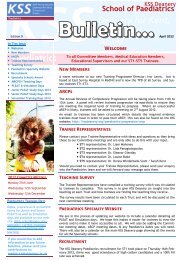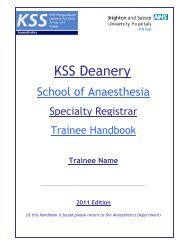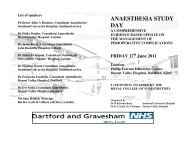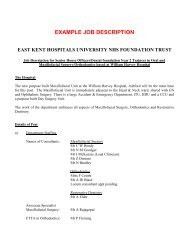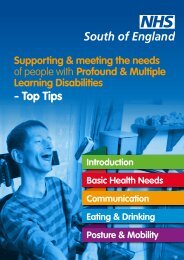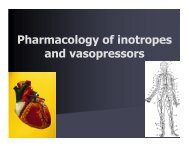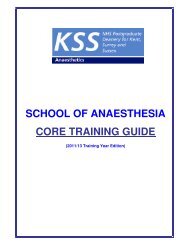Less than Full Time Training Policy - KSS Deanery
Less than Full Time Training Policy - KSS Deanery
Less than Full Time Training Policy - KSS Deanery
You also want an ePaper? Increase the reach of your titles
YUMPU automatically turns print PDFs into web optimized ePapers that Google loves.
<strong>KSS</strong> <strong>Deanery</strong><strong>Less</strong> <strong>than</strong> <strong>Full</strong> <strong>Time</strong> <strong>Training</strong><strong>Policy</strong>Reference:Status:K AllmanFinalVersion Number: 1.0Date Issued: 24 August 2010Supports Strategic Objective:Risk Assessment:Equality Impact Assessment:Managing and providing postgraduate and postregistration medical, dental and pharmacy education.In progressLegal Advice Required/Obtained:Review By:Originator:Master Location:Security:Publication Scheme:To be confirmedK AllmanK:\Human Resources\LTFT <strong>Training</strong>\<strong>Policy</strong> andGuidance\Final LTFT <strong>Policy</strong> - August 2010No Security IssuesPublicly Available Document<strong>KSS</strong> <strong>Less</strong> Than <strong>Full</strong> <strong>Time</strong> <strong>Training</strong> <strong>Policy</strong>.doc Page 1 of 15
ContentsPage1 Introduction …………………………………………………………….… 32 Purpose …………………………………………………………………… 33 Scope ……………………………………………………………………… 34 Eligibility ……………………………………………………………….…. 34.1 Eligibility Criteria ………………………………………………...… 34.2 Short Term LTFT <strong>Training</strong>………………………………………… 54.3 Eligibility Application ……………………………………………… 54.4 Eligibility Confirmation ……………………………………………. 54.5 Assistance with Completion of LTFT <strong>Training</strong> Forms …………. 55 Application Procedure ………………………………………………….. 55.1 Foundation Programme <strong>Training</strong> ………………………………... 65.2 Specialty <strong>Training</strong> …………………………………………………. 65.3 General Practice <strong>Training</strong> ………………………………………... 65.3.1 MRCGP ……………………………………………………..……… 75.4 Application and Approval <strong>Time</strong>lines ……………………………. 76 Approval …………………………………………………………………... 76.1 Funding Approval ……………………………………………….… 76.2 Educational Approval …………………………………………….. 76.3 LTFT <strong>Training</strong> Approval ……………………………………….…. 86.4 Agreed Start Date ……………………………………………….… 87 LTFT <strong>Training</strong> Options ………………………………………………..… 87.1 Slot Sharing ……………………………………………………...… 87.2 Reduced sessions in a full-time post ………………………….… 107.3 Supernumerary Placements …………………………………...… 108 Pay …………………………………………………………………….…… 109 Additional Guidance …………………………………………………..… 119.1 Statutory Leave ……………………………………………….…… 119.2 Study Leave ……………………………………………………..… 129.3 Annual Leave ……………………………………………………… 1210 Changes and Termination of LTFT <strong>Training</strong> ……………………..… 1211 Extensions ……………………………………………………………...… 1212 Appeals ………………………………………………………………….… 1213 Resources ………………………………………………………………… 1214 How to contact us ……………………………………………………..… 1315 Queries………….………………………………………………………..… 1416 Review of <strong>Policy</strong>……………………………………………….……….… 14Table 1: <strong>Less</strong> <strong>than</strong> <strong>Full</strong> <strong>Time</strong> training <strong>Deanery</strong> Contacts ……....… 13Table 2: Useful Websites ………………………….…………………… 14APPENDIX A: Application and Approval Process Flowchart ….… 15<strong>KSS</strong> <strong>Less</strong> Than <strong>Full</strong> <strong>Time</strong> <strong>Training</strong> <strong>Policy</strong>.doc Page 2 of 15
1 Introduction<strong>Less</strong> <strong>than</strong> <strong>Full</strong> <strong>Time</strong> (LTFT) <strong>Training</strong> (previously termed flexible training) is themeans by which doctors and dentists undertake their training when they areunable to work and train full time for “well-founded” reasons. The NHS iscommitted to flexible working arrangements across the health economy and LTFT<strong>Training</strong> is a method by which trainees can utilise the LTFT <strong>Training</strong> scheme tobalance their work and personal lives, as well as assisting those trainees who arein poor health or those who have a disability. In preparation of the policy, the<strong>Deanery</strong> has liaised with the BMA and NHS Employers, as well as a number ofTrust colleagues.2 Purpose and AimsThe purpose of this policy is to clarify how the LTFT <strong>Training</strong> scheme works, whois eligible to apply and the arrangements necessary to secure approval. Thescheme is also intended to make a meaningful contribution to the principles ofequality and diversity, particularly in relation to working parents and trainees witha disability. The policy also aims to demonstrate that <strong>KSS</strong> <strong>Deanery</strong> recognisesthe demographic trends in the medical and dental workforce and we are thereforecommitted to promoting and supporting access to LTFT <strong>Training</strong> opportunitiesacross <strong>KSS</strong> for eligible applicants. The <strong>Deanery</strong> consequently reviews andmonitors the demand for LTFT <strong>Training</strong> on a bi-annual basis and continues tomake improvements to the application and approval process, as well as themechanisms for constructing slot shares and raising the profile off slot sharingacross <strong>KSS</strong> by sharing examples of good practice and feedback from trainees.3 Scope<strong>KSS</strong> <strong>Deanery</strong> manages the LTFT <strong>Training</strong> scheme for eligible trainees across allmedical and dental training grades, although the focus of this policy primarilyrelates to medical trainees in postgraduate training. This policy deals with traineesin medical placements across the following: Foundation, Specialty (including GP,Core Specialty/Run-through and Higher Specialty <strong>Training</strong> programmes withinKent, Surrey and Sussex NHS Trusts.4 Eligibility4.1 Eligibility CriteriaAll trainees, both men and women, are eligible to apply for LTFT training.Those wishing to do so must show that training on a full-time basis would notbe practical for them for well-founded individual reasons (EC Directive93/16/EEC). The <strong>Deanery</strong> eligibility criteria will determine whether a trainee'srequest to train less <strong>than</strong> full time is well founded. If a trainee does not meetthe eligibility criteria, they should be encouraged to discuss alternative careerpathways with appropriate educational colleagues, eg. training programmedirector or clinical tutor.Formally, the only requirement to be permitted to train less <strong>than</strong> full time is awell founded individual reason. In practice, at present, reasons for needing totrain on a less <strong>than</strong> full time basis are put into two main categories for thepurpose of assessing eligibility. However, these categories are not exhaustive.<strong>KSS</strong> <strong>Less</strong> Than <strong>Full</strong> <strong>Time</strong> <strong>Training</strong> <strong>Policy</strong>.doc Page 3 of 15
Category 1Those doctors in training with:• disability or ill health (this may include those on in vitro fertilityprogrammes)• responsibility for caring (men and women) for children• responsibility for caring for ill/disabled partner, relative or other dependant.These result in the individual doctor or dentist being professionallydisadvantaged by circumstances, and less able to fulfil their potential on a fulltimerather <strong>than</strong> on a part-time basis.Category 2Those doctors in training with:• unique opportunities for their own personal/professional development, forexample training for national/international sporting events, or short term• extraordinary responsibility, for example a national committee• religious commitment – involving training for a particular religious rolewhich requires a specific amount of time commitment• non-medical professional development such as management courses, lawcourses, fine arts courses or diploma in complementary therapies.• Other well-founded reasons may be considered but it would be dependenton the particular situation and the needs of the specialty in which theindividual was training.Category 1 applicants have priority and deaneries will support allCategory 1 applicants, subject to available funds and training capacity.Access to Category 2 is dependent on individual circumstances and theavailability of funding. Where an application is refused by the deanery theapplicant has a right of appeal.All requests for LTFT training will be treated positively. However, the overalltraining capacity of a training programme and service commitment will have tobe taken into consideration. Trainees may train less <strong>than</strong> full time from theoutset or transfer from full-time to LTFT (and back again if required). Returnof trainees to full-time training, should this be required, will be facilitated butwill depend upon the availability of training capacity and funding. There maybe a delay in transferring back to full-time training. Access to LTFT training isresource limited. Whilst accepting that there is no automatic right to LTFTtraining, provisions should be made for those who meet the criteria. <strong>Deanery</strong>funding provides the educational component of the basic salary, and bandingarrangements are the responsibility of the employer. These fundingarrangements are intended to avoid financial disincentives for employers. Theavailability of LTFT training is ultimately dependent on available funding fromboth the deanery and NHS employers; however, where possible, appropriatemeasures should be taken to facilitate access.<strong>KSS</strong> <strong>Less</strong> Than <strong>Full</strong> <strong>Time</strong> <strong>Training</strong> <strong>Policy</strong>.doc Page 4 of 15
To avoid missing valuable educational opportunities, the trainee is alsoencouraged to be as flexible about their working pattern as is reasonablypracticable, which may involve the need to work full-time for a time limitedperiod,subject to negotiation.N.B. Clinical research should be accommodated within the trainingprogramme by negotiation with the programme director/regional adviser.Clinical research is NOT considered a reason to seek LTFT training; only inexceptional circumstances would research be considered a reason for trainingless <strong>than</strong> full time. Research should be accommodated within the ordinarytraining programme. By working with the programme directors, all doctors anddentists both full-time and those working flexibly should be enabled to pursueresearch as part of their normal training.Trainees will not normally be permitted to engage in any other paidemployment whilst undertaking LTFT <strong>Training</strong>. If in doubt, the trainee shouldraise the issue with the LTFT <strong>Training</strong> Adviser at email:less<strong>than</strong>fulltimetraining@kssdeanery.ac.uk4.2 Short Term LTFT <strong>Training</strong>The <strong>Deanery</strong> recognises that it may be necessary to support trainees forwhom there is a short term need to train less <strong>than</strong> full time. In such cases, the<strong>Deanery</strong> will encourage best practice and recommend that the employer takereasonable steps to accommodate such arrangements at local level, with theoption of reduced sessions in a full time post if the situation needs to beextended longer <strong>than</strong> anticipated.4.3 Eligibility ApplicationThe trainee will need to complete an LTFT <strong>Training</strong> Application Form toassess their eligibility to access LTFT <strong>Training</strong>. The form requires the traineeto specify which of the three criteria applies (See 4.1), and to return thecompleted form to the <strong>Deanery</strong> in good time. Trainees should aim to submitcompleted applications around 4-6 months prior to the preferred start date andit is possible that the approval will be declined if the form is submitted later<strong>than</strong> one month before this start date.4.4 Eligibility ConfirmationThe trainee will receive an Eligibility Confirmation Letter once the <strong>Deanery</strong> hasdeemed the trainee eligible. This letter does not constitute approval for thetrainee to commence in a LTFT <strong>Training</strong> post, as this requires completion offurther documentation.4.5 Assistance with Completion of LTFT <strong>Training</strong> FormsThe <strong>Deanery</strong> website at: www.kssdeanery.ac.uk includes a section on LTFT<strong>Training</strong>, including contact details for colleagues who may be able to assisttrainees with completion of the various forms. An LTFT Trainee ApplicantGuide can also be downloaded from the <strong>Deanery</strong> website and this isspecifically aimed at providing step by step guidance for LTFT traineeapplicants to follow in order to secure approval.5. Application ProcedureTo apply for LTFT <strong>Training</strong>, trainees should download and submit an LTFT<strong>Training</strong> Application Form from the <strong>KSS</strong> <strong>Deanery</strong> website, which will enable theLTFT <strong>Training</strong> Team to assess eligibility for LTFT <strong>Training</strong>.<strong>KSS</strong> <strong>Less</strong> Than <strong>Full</strong> <strong>Time</strong> <strong>Training</strong> <strong>Policy</strong>.doc Page 5 of 15
Where trainees are not currently working within the grade and specialty, they willbe expected to secure a full time post in open competition before they can beconsidered for an LTFT <strong>Training</strong> placement. As part of the full time trainingrecruitment process, trainees will be asked to specify if they wish to train less <strong>than</strong>full time. However, trainees will not be expected to discuss their wish to train less<strong>than</strong> full time as part of the recruitment process, as such dialogue would occurfollowing confirmation of an offer of allocation to a full time placement. This isimportant in order to ensure that the recruitment process remains free frompotential bias. Trainees will need to apply separately to the individual deanerywhere they are appointed for an LTFT application.The Application and Approval Flowchart (Appendix A) outlines the applicationand approval process for LTFT <strong>Training</strong> from initial enquiry to starting in an LTFT<strong>Training</strong> placement. Contact details are provided in section 13.5.1Foundation Programme <strong>Training</strong>Doctors who need to train less <strong>than</strong> full time must compete for entry intoFoundation <strong>Training</strong> on an equal basis with other applicants. They will alsoneed to achieve the competences as well as the equivalent of two years wholetime experience to meet the UK requirements for all Foundation Programmetrainees. NB: Please note that this document applies only to those SouthThames Foundation School (STFS) foundation doctors based in <strong>KSS</strong> <strong>Deanery</strong>local education providers. STFS foundation doctors, based in London<strong>Deanery</strong> local education providers, are required to follow a separate process.Foundation doctors, who are unclear as to which process they should follow,should contact STFS for advice.5.2 Specialty <strong>Training</strong> (including higher specialty)Specialty <strong>Training</strong> is competency based so trainees may completeprogrammes at different timescales. This will apply regardless of whether thetrainee is full time or training in a less <strong>than</strong> full time training placement but theLTFT trainee will need to be clear about the anticipated timescale forcompletion on the basis of completing the training on a less <strong>than</strong> full timebasis.With effect from 12 July 2010, <strong>KSS</strong> <strong>Deanery</strong> will manage the LTFT <strong>Training</strong>administration process for NEW higher specialty trainees and SpRs who arelocated in a <strong>KSS</strong> Trust, as well as those trainees who wish to extend theircurrent LTFT <strong>Training</strong> arrangements. From 1 April 2011, the scope ofmanagement will include all current LTFT trainees at higher specialty level.At present, the existing arrangements remain unchanged for full time <strong>KSS</strong>trainees, so the majority of higher specialty trainees continue to be managedby London <strong>Deanery</strong> on behalf of <strong>KSS</strong> <strong>Deanery</strong>. However, <strong>KSS</strong> has embarkedon a transitional phase of trainee management for higher specialty trainees in<strong>KSS</strong> and some specialties are already <strong>KSS</strong> managed. For further guidance,trainees are advised to liaise with their <strong>Training</strong> Programme Director.5.3 LTFT <strong>Training</strong> in General PracticeThe <strong>KSS</strong> <strong>Deanery</strong> GP Department is involved in the approval process forrelevant trainees. GP trainees across all GP training grades should contacttheir local GP <strong>Training</strong> Programme Director for advice and guidance. For GPposts in hospitals, the GP Department of <strong>KSS</strong> <strong>Deanery</strong> will continue to be<strong>KSS</strong> <strong>Less</strong> Than <strong>Full</strong> <strong>Time</strong> <strong>Training</strong> <strong>Policy</strong>.doc Page 6 of 15
involved in the GP LTFT <strong>Training</strong> approval process for GP trainees whilst theyare in their hospital placements (ST1 and ST2).The GP Department handles GP <strong>Training</strong> applications at ST3 (GP Registrars)direct. The GP Department website includes contact email details for <strong>KSS</strong> GPProgramme Directors at: http://www.kssdeanery.org/generalpractice/programme-directors.Any further queries can be directed to the GP<strong>Training</strong> Recruitment Manager. Please refer to section 13 for further GPDepartment LTFT <strong>Training</strong> contact details.5.3.1 MRCGPIn accordance with (COGPED Guidance on less <strong>than</strong> full-time training forgeneral practice, May 2008), trainees working less <strong>than</strong> full time need toensure they do their MRCGP workplace based assessments at the samefrequency during their training as full time trainees. This is particularlyrelevant to most of the work placed based assessments (WPBA), with theexception of some (e.g. PSQ) as the review and assessment schedule is notconsidered and collected on a pro rata basis. <strong>Full</strong> details are beyond thescope of this guidance and information is available on the RCGP website at:http://www.rcgp-curriculum.org.uk/nmrcgp/less_<strong>than</strong>_full_time_trainees.aspx5.4 Application and Approval <strong>Time</strong>linesThe Department of Health (DH) recommend that the LTFT <strong>Training</strong> applicationand approval process is completed within three months from application tocompletion of approval. The Application and Approval Flowchart (AppendixA) shows the stages of the process, including an approximate timeline forcompletion of the process. This relies upon the trainee being proactive insecuring completion of the various forms and other documentation and followupactions as required.6 Approval6.1 LTFT <strong>Training</strong> Funding ApprovalSlot shares are subject to funding availability and written funding approval isrequired from the <strong>Deanery</strong> before these placements can go ahead. Wheneligibility confirmation for LTFT <strong>Training</strong> is sent to the trainee, it indicates that thetrainee will need to commence on the start date specified. In order to managethe scheme and the available funds, it is essential that the trainee informs the<strong>Deanery</strong> if the anticipated start date needs to be modified. Where there arefunding implications, this enables other trainees to benefit in the event that LTFT<strong>Training</strong> is no longer required.6.2 LTFT <strong>Training</strong> Educational ApprovalSince 1 December 2007, in conjunction with Royal Colleges/Faculties, Deanerieshave responsibility for ensuring that all LTFT <strong>Training</strong> of any kind is undertaken inprospectively approved posts and programmes and, which meet the statutoryrequirements of the General and Specialist Medical Practice (Education, <strong>Training</strong>and Qualifications) Order 2003 and the requirements of the FoundationProgramme Curriculum. Whilst <strong>KSS</strong> <strong>Deanery</strong> is unable to fund supernumeraryplacements, it is possible that some supernumerary arrangements will still existwithin the scheme for a protected period up to 2011 but not beyond. Doctorsworking in supernumerary LTFT <strong>Training</strong> posts must therefore apply foreducational approval from the <strong>Deanery</strong> by completing the Educational ApprovalForm. For hospital posts, the <strong>KSS</strong> form requires completion by the Speciality<strong>Training</strong> Programme Director or nominated Specialty School representative. GP<strong>KSS</strong> <strong>Less</strong> Than <strong>Full</strong> <strong>Time</strong> <strong>Training</strong> <strong>Policy</strong>.doc Page 7 of 15
<strong>Training</strong> posts require approval by the Head of <strong>KSS</strong> School of General Practiceand Foundation posts require approval by the STFS Director/Associate Director.6.3 LTFT <strong>Training</strong> ApprovalThe approval process is not complete until the trainee receives writtenconfirmation following full completion of the LTFT <strong>Training</strong> Funding ApprovalForm. This form requires completion by the trainee, the employing trust and the<strong>Deanery</strong>.6.4 Agreed Start DateIt is very important that trainees remain in regular contact with the <strong>Deanery</strong> tocommunicate any information which may impact on the trainee’s preferred startdate for LTFT <strong>Training</strong>. This includes changes to address, names, employinglocation, working hours and/or periods of long-term absence, e.g. maternitybreaks/serious illness.7 LTFT <strong>Training</strong> PlacementsWith effect from 21 July 2010, LTFT <strong>Training</strong> in <strong>KSS</strong> <strong>Deanery</strong> may be undertakenin one of two ways. These are listed below.7.1 Slot SharingOver time, the LTFT <strong>Training</strong> section of the <strong>Deanery</strong> website will be updated withtrainee experiences so that good practice can be shared across the local healtheconomy. In the meantime, this section focuses on clarifying how it is expectedto operate and how the <strong>Deanery</strong> will contribute to the funding and support of bothtrainees and employer colleagues. This aims to include slot sharingarrangements that exist in specialties which appear to be less popular for LTFT<strong>Training</strong>, as well as some useful hints and tips which might need to be consideredif slot sharing is to succeed as the means of facilitating LTFT trainee demand andseeking to mainstream the needs of LTFT trainees, as was the intention of ‘TheNew Pay Deal’ which was introduced for LTFT <strong>Training</strong> back in June 2005. Laterin this policy, there are further references to the principles and pay arrangementswhich were anticipated when the changes were introduced.In <strong>KSS</strong> <strong>Deanery</strong>, Slot sharing works on the basis that two trainees share one fulltimepost and manage any out-of-hours between them. However, each doctormay work up to 80% whole time equivalent (WTE) and is paid as an individualtrainee on the basis of actual contracted hours. Slot sharing is distinct from jobsharingas it does not restrict the postholders to work 50% of a full-time post.This option tends to provide the most effective means of meeting the trainee’seducational needs and, in <strong>KSS</strong>, slot sharing must be explored before anyalternative options are considered. <strong>KSS</strong> <strong>Deanery</strong> recommends that LTFTtrainees work a minimum of 50% in order to retain their skills and to achievenecessary competences.The <strong>Deanery</strong> funding for slot shares currently provides the employer with surplusfunds as an incentive, which can be used to support the LTFT <strong>Training</strong>placement, which may not be the case in other Deaneries, who may require slotsharers to work 50:50. Whilst both trainees are paid for actual hours worked,subject to available funds, the employer will receive additional reimbursement asoutlined in the Slot Share Example below. It is recognised that LTFT trainee slotshare partners may change during the training programme, depending on theindividual training needs and circumstances and reasonable steps should betaken by the employer and the <strong>Deanery</strong> to accommodate the needs of the<strong>KSS</strong> <strong>Less</strong> Than <strong>Full</strong> <strong>Time</strong> <strong>Training</strong> <strong>Policy</strong>.doc Page 8 of 15
emaining slot share partner, whilst trying to fill the vacant proportion of thetraining slot. It is also possible that the slot sharers may start/finish at slightlydifferent times if this is necessary to accommodate a slot share arrangement, forexample: A new LTFT trainee is due to start a slot share placement in Augustand the slot share partner is returning from maternity leave in September. If thereis no scope for the two trainees to commence on the same date, this brief gap,where the trainees are not concurrently in post, may be feasible if the service canaccommodate this.Slot Share Example:Trainee A works 0.7Trainee B works 0.6Trainee A is funded on the basis of 1.0 WTE, ie surplus of 0.3*Trainee B is funded on the basis of 0.6 WTE*The surplus 0.3 WTE from Trainee A’s funded placement comes fromexisting funding sources for a substantive training post and can be used bythe employer to support the LTFT <strong>Training</strong> arrangement at local level.The need for slot share placements may be identified through a range ofchannels, such as:• During a managed recruitment process, where applicants will have indicated aneed on their application form• Trainee ill health or disability arises• Trainees return from maternity leave or express a need for more flexibleworking arrangements to balance work and family commitments, ie caring fordependents or child starts primary school/nursery place• Trainee(s) with special circumstances• The LTFT <strong>Training</strong> Team confirming details of trainees who have receivedeligibility confirmation and therefore require an LTFT <strong>Training</strong> placementFactors to consider:• The potential working patterns need to be discussed between the trainees sothat educational and personal needs can be appropriately balanced withservice needs. This requires flexibility and professionalism on the part of thetrainee to reach a workable compromise which suits the relevant parties,particularly where specific working days are required by both parties, eg. toaccommodate child care needs or to attend medical appointments related tohealth concerns or disability.• The slot sharers could work at separate times of the week or they couldperhaps overlap for a day or more, particularly on busy days or to facilitatecontinuity for the service.• Whether the trainees need to meet with each other for the purpose ofhandover or other shared roles and responsibilities.• Shared (3-way) meetings with the Educational/Clinical Supervisor.• Ensuring that the slot share partners' manager and colleagues know how theslot sharing arrangement works in practice, in particular when enquiries arisein relation to areas of responsibility for which the shared job role isresponsible.<strong>KSS</strong> <strong>Less</strong> Than <strong>Full</strong> <strong>Time</strong> <strong>Training</strong> <strong>Policy</strong>.doc Page 9 of 15
• Managing the slot sharing arrangement so that the two slot sharers are keptinformed of each other's activities and progress, ensuring that repetition ofwork is avoided and that no activities or responsibilities fall into the gapbetween the two people.• Arranging access to training for slot sharers where the two individuals do notwork the same hours.• Ensuring consistent performance standards between the two slot sharers,particularly where they are responsible for managing other members of staff.• <strong>Time</strong>ly maintenance of the slot share arrangement should one slot sharerleave or go on long-term leave.7.2 Reduced Sessions in a <strong>Full</strong>-<strong>Time</strong> PostA trainee occupies an established full-time post but works reduced hours. Noadditional funding is required from the <strong>Deanery</strong> as the full-time post is alreadyfunded from existing funding sources for a substantive training grade, but theemployer is able to retain the surplus funds to support the LTFT arrangement atlocal level. However, the trainee would still need to complete the LTFT <strong>Training</strong>Application and Approval Forms, as there is a national requirement to report onLTFT <strong>Training</strong> arrangements to the Department of Health via the national LTFT<strong>Training</strong> Forum, which is attended by members of the LTFT <strong>Training</strong> Team. TheTrust would also need to confirm their written approval to support thisarrangement, as well as clarifying that the full time post was secured in opencompetition.7.3 Supernumerary PlacementsMost Deaneries are unable to fund supernumerary LTFT <strong>Training</strong> placements,which includes <strong>KSS</strong> <strong>Deanery</strong> as of 21 July 2010, when the financial constraintsmade it no longer viable to fund in this way. These placements were fully fundedby the <strong>Deanery</strong> and enabled employers to create a new post in to which the LTFTTrainee would be slotted and the substantive full time post could be back-filled.This arrangement requires specific Educational Approval to ensure the sameaccess to educational elements as that of a full time trainee, including out ofhours, access to departmental meetings, audit, research and teaching. Whilstsome supernumerary arrangements will be protected for a time-limited period, it isanticipated that supernumerary LTFT placements will be phased out by 2011.The <strong>Deanery</strong> recognises that the geography of <strong>KSS</strong> may prove challenging toaccommodate slot shares but the priority is to spread the access to the limitedfunds available in order to meet the ongoing demand. In addition, the approachalso supports the Department of Health principle that LTFT <strong>Training</strong> trainees areaccommodated into the rest of the workforce population as a commitment tomainstreaming LTFT <strong>Training</strong>.8 PayThis section is based on the national guidance from NHS Employers which waspublished in June 2005 with the aim of improving access to LTFT training [Equitablepay for flexible medical training, 2005]. The system for paying LTFT trainees is onewhere the basic salary is determined by the actual hours of work, as derived initiallyfrom the rota and confirmed by monitoring.A division into four-hour bands based on hours of actual work enables someaveraging to take place, and the pay for each band is based on the lower hours limit.<strong>KSS</strong> <strong>Less</strong> Than <strong>Full</strong> <strong>Time</strong> <strong>Training</strong> <strong>Policy</strong>.doc Page 10 of 15
Thus:F5 is 20 or more and less <strong>than</strong> 24 hours of actual work a week and attracts 0.5F6 is 24 or more and less <strong>than</strong> 28 hours of actual work a week and attracts 0.6F7 is 28 or more and less <strong>than</strong> 32 hours of actual work a week and attracts 0.7F8 is 32 or more and less <strong>than</strong> 36 hours of actual work a week and attracts 0.8F9 is 36 or more and less <strong>than</strong> 40 hours of actual work a week and attracts 0.9}OffulltimebasicsalaryAdded to this is a supplement, paid as a proportion of the basic salary identifiedabove, to reflect the intensity of the duties.This system has the advantage of proportionality, and loses the image of ‘a full basicsalary plus a supplement’ for part-time work that the service finds so difficult toaccept. It also benefits from being based on hours of actual work, and is thusdemonstrably equitable.0.5Total salary = salary* + salary* x 0.40.2*salary = F5 to F9 calculated as above.The supplements will be applied on the basis as set out below:• Band FA – trainees working at high intensity and at the most unsocial times.• Band FB – trainees working at less intensity at less unsocial times.• Band FC – all other trainees with duties outside the period 8am to 7pm Monday toFriday.BandSupplement Payable as aProportion of thecalculated basicFA 50%FB 40%FC 20%9 Additional Guidance9.1 Statutory LeaveSubject to available funds, the <strong>Deanery</strong> will fund up to three months of a statutoryperiod of absence, e.g. maternity/long-term sickness, for LTFT trainees. Traineeswho discover they are pregnant during training should notify the <strong>Deanery</strong> ofanticipated start and end dates of maternity leave as well as informing otherrelevant bodies, e.g. employing Trust/Foundation School. If there is a change tothe initially approved LTFT <strong>Training</strong> end date, trainees will need to apply for aLTFT <strong>Training</strong> extension using a LTFT <strong>Training</strong> Extension Application Form,which can be downloaded from the <strong>Deanery</strong> website. The employer should beconsulted with regard to advice and guidance on entitlements to maternity payand leave and will normally provide a maternity policy, which will detail theentitlements and requirements of the employment. The <strong>Deanery</strong> website alsoprovides some general guidance on maternity and pregnancy duringpostgraduate training.<strong>KSS</strong> <strong>Less</strong> Than <strong>Full</strong> <strong>Time</strong> <strong>Training</strong> <strong>Policy</strong>.doc Page 11 of 15
9.2 Study LeaveLTFT trainees are entitled to equality of access to study leave, out-of-hoursworking and all other employment rights and protections. In particular, the right oftimely return to appropriate work from maternity leave will be respected andpromoted.9.3 Annual LeaveAnnual leave and public holidays for LTFT trainees is calculated on a pro-ratabasis. Advice should be sought from the employing organisation, usually MedicalStaffing.10 Changes and Termination of LTFT <strong>Training</strong>Where there is a change to the trainee’s personal circumstances, e.g. contactaddress/telephone or LTFT <strong>Training</strong> placement details, eg. Increase or decreaseto training sessions, this should be notified to the LTFT <strong>Training</strong> Team andFoundation/Specialty School as soon as reasonably practicable. This can beemailed to: less<strong>than</strong>fulltimetraining@kssdeanery.ac.uk. This includes terminationof LTFT <strong>Training</strong> and is very important as this could free a slot which could beutilised to meet the needs of another trainee. If a trainee is unsure whether theLTFT <strong>Training</strong> Team should be informed of a particular change, they can email forclarification and the LTFT <strong>Training</strong> Adviser will be pleased to assist.11 ExtensionsAn Extension Application should be completed if a LTFT Trainee’s approval isdue to expire and the trainee needs to continue to train less <strong>than</strong> full time beyondthe expiry date. It is recommended that an application is requested at least 4-6months in advance of the extension start date and returned to the LTFT <strong>Training</strong>Team at least 3 months before the start date of the new LTFT <strong>Training</strong>placement. In <strong>KSS</strong>, extensions can be used to move from one training grade toanother, eg ST1 to ST2, but trainees will need to reapply for LTFT <strong>Training</strong> if theychange programme level, eg, from Foundation to Specialty.12 AppealsIt is recommended that trainees first attempt to resolve any issues informally indiscussion with the <strong>Deanery</strong>. If agreement cannot be reached, the trainee willhave recourse to the formal LTFT <strong>Training</strong> Appeals Process, which can bedownloaded from the <strong>Deanery</strong> website.13 ResourcesTrainees who are interested in training less <strong>than</strong> full time should first visit the<strong>Deanery</strong> website and select the ‘<strong>Less</strong> Than <strong>Full</strong> <strong>Time</strong> <strong>Training</strong>’ option from theHome Page ideally before making contact. Trainees are also advised to discusstheir potential application with their Clinical/Educational Supervisor and, whereapplicable, a <strong>Training</strong> Programme Director, Medical Workforce Project Officer orFoundation School Manager, who may be able to offer invaluable advice on theeducational implications of training less <strong>than</strong> full time. Other useful contactsinclude the Trust Medical Education Manager and Trust Medical Staffing<strong>KSS</strong> <strong>Less</strong> Than <strong>Full</strong> <strong>Time</strong> <strong>Training</strong> <strong>Policy</strong>.doc Page 12 of 15
Manager. Trainees are also advised to consider that other departments will beinvolved in completion of the forms, eg. Trust Finance.14 How to contact usThe LTFT <strong>Training</strong> Scheme is resourced through the <strong>KSS</strong> <strong>Deanery</strong> HRDepartment by an LTFT <strong>Training</strong> Adviser (Eleanor Gosnell), who can be reachedby email at the generic email address: less<strong>than</strong>fulltimetraining@kssdeanery.ac.ukOther useful email addresses for <strong>Deanery</strong> contacts (including the South ThamesFoundation School) are listed below in Table 1: LTFT <strong>Training</strong> <strong>Deanery</strong>Contacts.Table 1 : <strong>Less</strong> <strong>than</strong> <strong>Full</strong> <strong>Time</strong> <strong>Training</strong> <strong>Deanery</strong> ContactsRole Contacts Email<strong>KSS</strong> DEANERY LESS THAN FULL TIME TRAINING TEAMAdministratorMain ContactManagerLead Dean<strong>KSS</strong> <strong>Deanery</strong>less<strong>than</strong>fulltimetraining@kssdeanery.ac.ukLTFT <strong>Training</strong> Adviser<strong>KSS</strong> <strong>Deanery</strong>less<strong>than</strong>fulltimetraining@kssdeanery.ac.ukKaren Allman<strong>KSS</strong> <strong>Deanery</strong>less<strong>than</strong>fulltimetraining@kssdeanery.ac.ukDr Subir MukherjeeOTHER <strong>KSS</strong> DEANERY/FOUNDATION SCHOOL CONTACTSTrainee Grade Contacts EmailFoundation South Thames Foundation enquiries@stfs.org.uk(F1)SchoolFoundation(F2)SpecialtySpecialtySpecialtySpecialtySpecialtySpecialtySpecialtySpecialtySpecialtySpecialtyAll LevelsAll LevelsBeverley OsbourneSouth Thames FoundationSchoolChristine BridgeACCSDr Paul RansomAnaesthesiaDr Chris CareyEmergency MedicineAngela FeazeyICMPeter AndersonMedicineDr Andrew ElkinsObstetrics & GynaecologyMs Sarah FlintPaediatricsDr Sarah BirksPsychiatryDr Philip HallRadiologyDr Camilla SonksenSurgery (Core)Ms Elizabeth SharpeGeneral PracticeGP Programme DirectorsGeneral PracticeElena Gonzalezenquiries@stfs.org.ukaccs@kssdeanery.ac.ukanaesthetics@kssdeanery.ac.ukemergencymedicine@kssdeanery.ac.ukICM@kssdeanery.ac.ukcmt@kssdeanery.ac.uko&g@kssdeanery.ac.ukpaediatrics@kssdeanery.ac.ukpsychiatry@kssdeanery.ac.ukclinicalradiology@kssdeanery.ac.ukcoresurgery@kssdeanery.ac.ukhttp://www.kssdeanery.org/generalpractice/programme-directorsTel: 0207 415 3487egonzalez@kssdeanery.ac.uk<strong>KSS</strong> <strong>Less</strong> Than <strong>Full</strong> <strong>Time</strong> <strong>Training</strong> <strong>Policy</strong>.doc Page 13 of 15
Table 2 : Useful WebsitesOrganisationWebsiteBMAwww.bma.org.ukCollege of Emergency Medicine www.collemergencymed.ac.uk/cemFaculty of Public Health Medicine www.fphm.org.ukGeneral Medical Councilwww.gmc-uk.orgHope for Doctorswww.help4medics.co.uk<strong>KSS</strong> <strong>Deanery</strong>www.kssdeanery.ac.uk<strong>KSS</strong> Specialty Schoolshttp://www.kssdeanery.org/specialtyLondon <strong>Deanery</strong>www.londondeanery.ac.ukMMCwww.mmc.nhs.ukNHS Employerswww.nhsemployers.orgNorth Central Thames Foundation School www.ucl.ac.uk/medicalschool/nctfs/North East Thames Foundation School www.netfs.org.uk/North West Thames Foundation School www1.imperial.ac.uk/medicine/teaching/prho/Royal College of Anaesthetistswww.rcoa.ac.ukRoyal College of General Practitioners www.rcgp.org.ukRoyal College of Obstetricians andGynaecologistswww.repromed.net andwww.rcog.org.ukRoyal College of Ophthalmologists www.rcophth.ac.ukRoyal College of Paediatrics and Child www.rcph.ac.ukHealthRoyal College of Physicianswww.rcplondon.ac.ukRoyal College of Psychiatristswww.rcpsych.ac.ukRoyal College of Radiologistswww.rcr.ac.ukRoyal College of Surgeons of England www.rcseng.ac.ukSouth Thames Foundation School www.stfs.org.uk/15 QueriesAny queries regarding this policy and guidance should be directed by email to:less<strong>than</strong>fulltimetraining@kssdeanery.ac.uk.16 Review of policyThis document will be reviewed on the date specified on the cover page or earlierif the need arises.<strong>KSS</strong> <strong>Less</strong> Than <strong>Full</strong> <strong>Time</strong> <strong>Training</strong> <strong>Policy</strong>.doc Page 14 of 15
Appendix A: Application and Approval Process FlowchartPostgraduate <strong>Deanery</strong> for Kent, Surrey and Sussex<strong>Less</strong> Than <strong>Full</strong> <strong>Time</strong> (LTFT) <strong>Training</strong>Application and Approval ProcessStage 1Making anApplicationTrainee downloads LTFTapplication from the <strong>Deanery</strong>WebsiteTrainee returns completedapplication form to <strong>Deanery</strong>At the start<strong>Deanery</strong> assesseseligibility<strong>Deanery</strong> confirmsineligibility fortraining to traineeStage 2EligibilityconfirmationTrainee not yet in postTrainee already has full-time postConfirmationwithin 1weekTrainee applies forpost in opencompetitionPost acquiredTrainee informs FoundationSchool/ Specialty <strong>Training</strong>Programme Director of elibilityconfirmation and discusses LTFT<strong>Training</strong> optionsStage 3 & 4Funding andEducationalApprovalSlot SharePreferred OptionFollowing career/education discussionwith Foundation/Specialty school,trainee relinqueshes full time post andpasses LTFT <strong>Training</strong> FundingApproval Form to employingorganisation and, where applicable,Foundation School for completionLTFT <strong>Training</strong>Placements ConsideredReduced sessionsIf slot share unavailableFollowing career/education discussionwith Foundation/Speciatly School,trainee passes LTFT <strong>Training</strong> Fundingapproval Form to employingorganisation and, where applicable,Foundation School for completionFundingApproval4 – 6WeeksTrainee returns fullycompleted forms to <strong>Deanery</strong>EducationalApproval2-3Weeks<strong>Deanery</strong> to assess approvaldocumentationStage 5ApprovalConfirmation<strong>Deanery</strong> confirms funding and educational approval totrainee, employing organisational and Foundation/Specialty School of approval for LTFT <strong>Training</strong>Trainee commences in post(trainee should not commence prior to receiptof written <strong>Deanery</strong> approval)ConfirmationWithin2 weeks<strong>KSS</strong> <strong>Less</strong> Than <strong>Full</strong> <strong>Time</strong> <strong>Training</strong> <strong>Policy</strong>.doc Page 15 of 15



